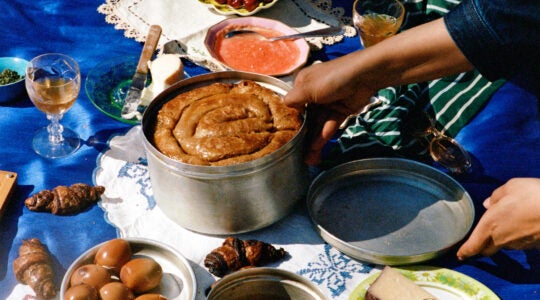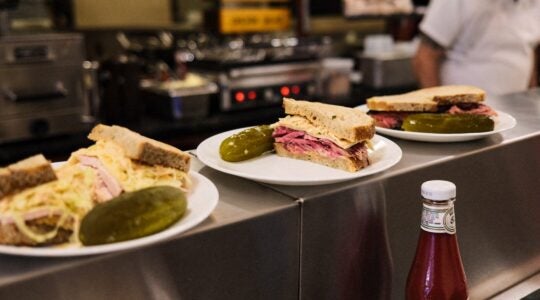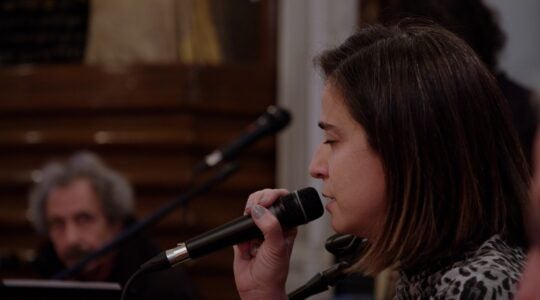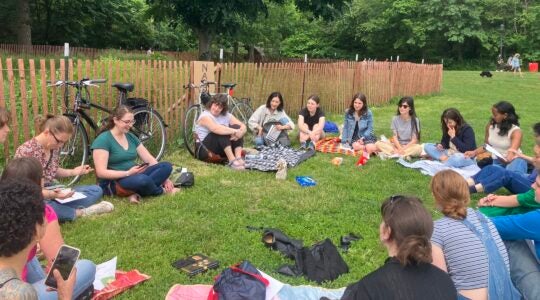For Shelley Cohen, a member of Lincoln Square Synagogue on the Upper West Side and a mother of three, traveling anywhere with her oldest child, a 20-year-old quadriplegic confined to a wheelchair, can often prove taxing. Her son Nathaniel is afflicted with Duchenne muscular dystrophy, a congenital, rapidly progressive illness that destroys the body’s muscles.
But that didn’t stop Cohen, her husband, Ruvan, and Nathaniel from attending last Sunday’s “Save Darfur” rally in Washington, a protest on the National Mall that drew an estimated 75,000, according to organizers, many of them Jewish. The three traveled to Washington by train, said Cohen.
Cohen, in a phone interview, said there was never any doubt in her mind that she and her family would attend the rally — in large part, because she is the daughter of Holocaust survivors.
“I have a really heightened sensitivity about the importance of human life,” said Cohen, who called the ethnic cleansing in Darfur a genocide, a term also used by others, including President Bush. She added that Jews who attended the rally “were there to say, ‘We care about every human life.’ ”
The Holocaust, in fact, came up time and time again during the rally in conversations with Jewish participants. Some said that if the much-repeated phrase “Never Again” is to have any true value, it must apply to everyone.
“We say that all the time in our synagogue,” said Rabbi Lee S. Paskind of Congregation Ahavat Shalom, a Conservative synagogue in Lakewood, N.J. “We’ve sat by too many times and watched too many genocides over the past 30 years. We have to figure out how to work together [with other groups] to prevent this.”
Many people often stand by, doing nothing, as genocides take place, said Ben Linden, 17, of Larchmont, N.Y., “and I didn’t want to be counted among them.” Linden, a member of the Westchester Jewish Center in Mamaroneck, added that his mother’s parents are Holocaust survivors and that he hoped his presence, in some way, made up for what happened to them.
The rally’s first speaker, Nobel laureate Elie Wiesel, made the same link for the crowd, comparing the ethnic cleansing in Darfur and his own suffering at Auschwitz. “As a Jew,” he said, “I’m here because when we needed people to help us, nobody came.”
He also told the crowd that the rally was being held “because of leaders who are timorous, complacent and unwilling to take risks. We want them to take risks and stop the massacre.”Other speakers included New Jersey Gov. Jon Corzine, Sen. Barack Obama (D-Ill.) and Rep. Nancy Pelosi (D-Calif.), minority leader of the House of Representatives; celebrities such as actor/director George Clooney and refugees from Darfur, a region of the western Sudan. The roster also included the Rev. Al Sharpton and James J. Zogby, president of the Arab American Institute.
But the crowd also heard from Ruth Messinger, president of the American Jewish World Service; Rabbi Steve Gutow, executive director of the Jewish Council for Public Affairs; Rabbi David Saperstein, director of the Reform movement’s Religious Action Center; and Rabbi Marc Schneier, founding president of the Foundation for Ethnic Understanding. The choice of speakers reflected the history and extent of Jewish involvement in the rally, which was sponsored by the Save Darfur Coalition, a collection of 150 faith-based, advocacy and humanitarian agencies. The group took shape two years ago at the initiative of the American Jewish World Service, an international development agency, and the U.S. Holocaust Memorial Museum. AJWS and the Jewish Council for Public Affairs, members of the coalition’s steering committee, assumed lead roles in mobilizing the Jewish community.
The results could be seen at the rally, where the sea of diversity included many from the Jewish community. They arrived by bus, train and plane — some from as far away as Portland, Me.; El Paso, Texas, and Los Angeles. Many wore knitted kipot; some, black hats; and others, T-shirts identifying them as members of Hillel, Hadassah, Young Judaea and other groups.
Most who attended from New York City traveled to the rally aboard buses arranged by the Jewish Community Center in Manhattan, which was named by AJWS to handle transportation logistics for the five boroughs.
Sarah Kay, the JCC’s director of community programs, said the number of local participants far exceeded her organization’s goal of 5,000. In the end, she added, she and her colleagues arranged for 87 buses, most of them leaving from synagogues, day schools and other community organizations.
The largest contingent of city residents represented Yeshiva University, which sent 330 students, faculty members and staff to the rally. Those aboard the buses included YU President Richard Joel, said Rebecca Stone, a recent YU graduate and, currently, a staff member at YU’s Office of University Life.
“There’s no greater cause for the Jewish people than to fight genocide,” said Stone, 23, who organized the school’s participation in the event. Many of those at the rally, like Penny Linden of Larchmont and Mindy Weinblatt of Forest Hills, Queens, went to the event with their children.
Linden, who traveled to the rally with her youngest son, Ben, said he grew up hearing about his grandparents’ experiences during the Holocaust, as she did when she was a child. She is certain that those stories pushed her son to become active in the Darfur issue at high school, although, she added, he has long been involved in other political issues.
Weinblatt, a member of the Forest Hills Jewish Center, went to the rally with her 13-year-old daughter, Gabrielle, believing it was important for her child to learn about “how people can promote justice — tikkun olam.” The rally was the first her daughter ever attended, said Weinblatt, who reports that her daughter became “wide-eyed” at the event but also “more aware of how crucial it is to speak out about a horror like this.”
Weinblatt, who attended demonstrations in the 1980s on behalf of Soviet Jewry, works with Holocaust survivors through Selfhelp Community Services, a local Jewish agency, and said some of her clients told her that “if only there had been rallies like this during the Holocaust, more lives might have been saved.”
Many of those at the rally — speakers and participants alike — said the event brought together Jews and blacks on behalf of a common cause for the first time since the civil rights movement and that it has the potential of sparking a new alignment for social justice.
Rabbi Gutow of the Jewish Council for Public Affairs said in an interview that the effort to mobilize the Jewish community on behalf of Darfur offers a model for a new kind of Jewish activism. Citing AJWS, a lesser-known Jewish agency that emerged as a galvanizing force on the issue, he suggested that working with such groups could benefit more established organizations and “bring in Jews we don’t normally see.”
The effort, he added, was “an amazing statement of what we can do when we mobilize the full range of our resources, become passionate and unite around an issue.”
Locally, Rabbi Jeremy Kalmanofsky of Congregation Ansche Chesed, a Conservative synagogue in Manhattan, said he hoped social action on behalf of one cause “will breed more social action,” just as one mitzvah produces another.
Others, however, counseled caution.Rabbi Joy Levitt, associate executive director of the JCC, said that, while “it’s heartening to see how so many people got together, we have to be mindful that there isn’t consensus on other issues.” She added that Jewish organizations “have to keep the eye on the prize, which is ending the genocide in Darfur.”
Washington Correspondent James Besser contributed to this report.
The New York Jewish Week brings you the stories behind the headlines, keeping you connected to Jewish life in New York. Help sustain the reporting you trust by donating today.




